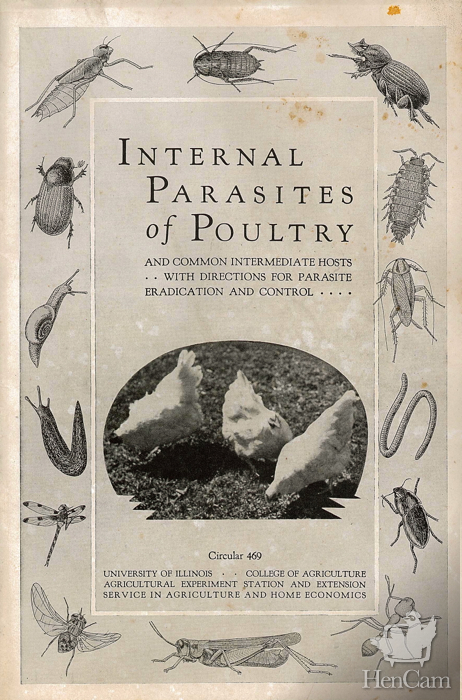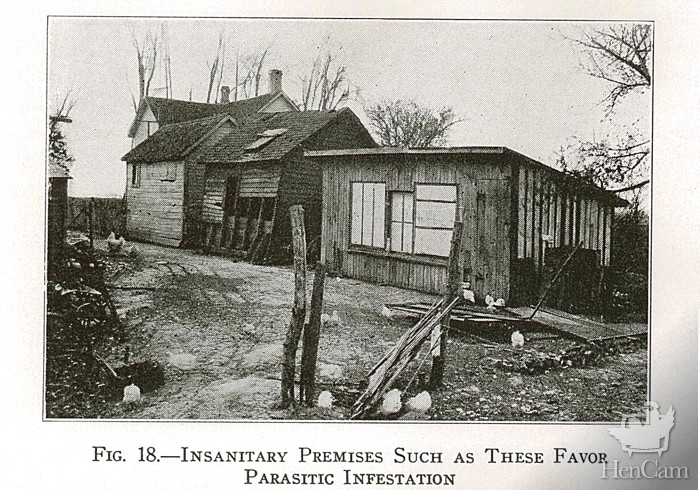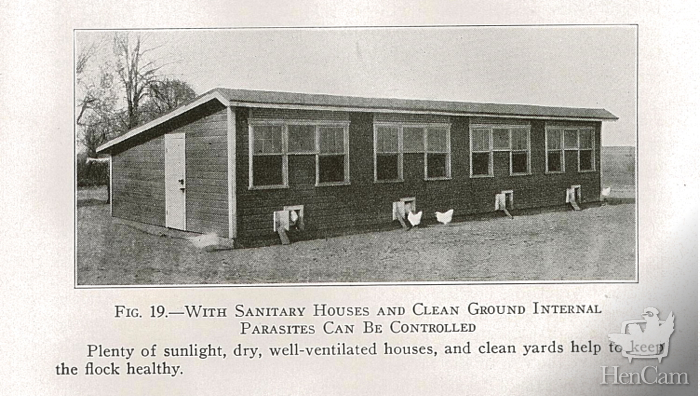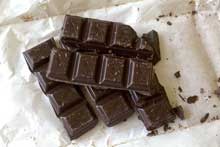It’s gross and you don’t want to think about it, but chickens have nasty parasites inside of them. There are various types of roundworms, tapeworms and flukes that live in the intestines, the eyes, the throats and the gizzards. A chicken with a heavy parasite load shows a loss of vitality, fewer eggs and a lowered disease resistance.
I’ve been researching and reading about this, both on-line and in books. But perhaps the best advice I’ve seen has come from this 1941 booklet.
The good news is that the parasites that live inside of poultry are avian-specific. They don’t live thrive inside of people. They don’t live inside of dogs. The parasite starts in one bird, and then its eggs are expelled in the manure, which are ingested by intermediary hosts (usually some type of insect that chickens find yummy) which then get eaten by another chicken. And so the cycle continues.
If you build a coop in your suburban backyard that hasn’t seen a chicken in 50 years, then it’s unlikely that for the first few seasons of hen keeping that your birds will harbor any parasites at all. Eventually, though, the parasites will come in via wild birds. Or maybe you’ll visit a friend who has chickens and you’ll get mud (and the parasites’ eggs) on your boots. Maybe you’ll pick up a bird at a sale. Eventually parasites will lurk on your property. But, that doesn’t mean that you have to dose your chickens with drugs. Management is the key to keeping your chickens healthy.
Notice how the cover of the brochure shows only one worm, but many intermediary hosts. That’s because it’s those common insects that are the key. Get rid of those hosts to break the cycle and your flock will be fine.
Beetles and flies need warm, moist and dark environments to breed. Eliminate those from your coop and pen. Also, the quicker you remove manure, the less time the eggs have to transfer into the ground and into the hosts. Rake it up. Compost it away from your flock.
This pamphlet shows quite clearly the difference between a sanitary coop and a parasite breeding ground.
Keeping coops tidy isn’t just for appearances. It will also keep your hens healthy.
Every few years I take a fecal sample to the vet to test for worms. Only once did it come back positive for tapeworms. At the time, my chickens didn’t show symptoms and I never saw bits of tapeworm in the manure. Chickens are naturally resistant to parasites. So, I did not run out and purchase a chemical wormer. I did get rid of the pile of damp hay that the chickens were scratching in. I did start removing all of the manure daily from the coop and pen. I haven’t seen a hint of internal parasites since. (This is confirmed by the fact that in the several necropsies that I’ve done, that I’ve yet to see a single internal parasite.)
Some people worm on a regular basis. Some use febendezole, (known as flubnavet in the UK) which is the same thing as Safeguard horse wormer. It is not approved by the US government for chickens. Others use wazine, which is approved only for young stock and not for laying birds. Wazine is only effective on roundworms. The problem with regular worming of either of these, is that parasites develop resistance to drugs, and when you really need the chemicals to work, they will no longer be effective. I’m not minimizing the real problems that many flocks have with parasites. This pamphlet stated Internal parasites are the most widespread cause of poultry maladies. It also stated Sanitary management is the most effective weapon against these flock enemies. In 1941, Febendazole had yet to be invented. But, I’d still say that management is the first and best step. The chemicals will work once. Maybe twice. But, as we’re seeing with overuse of antibiotics, they are not a longterm solution.
There are so-called organic parasite controls on the market, herbal and otherwise. I’ve yet to see a study that showed that flocks infested with parasites saw an elimination of the problem with these products, but perhaps they are a worthwhile preventative. I’ve never used them so can’t vouch either way. Some claim that pumpkins are a preventative. Likely, it’s a chemical in the seeds, but getting the right amount in year round is not practical. Still, pumpkins are good for other reasons, so during pumpkin season it’s worth letting the hens eat them. I believe in providing food-grade diatomaceous earth in my hens’ dust baths to control external parasites. This might also help to control internal parasites. In any event, the natural supplements can’t hurt, but they aren’t a replacement for good management.
But, what happens if you do have an obvious, serious infestation? What if you see worms in the manure and your chickens look poorly? The first step is to do everything that you can to prevent re-infestation. If it’s possible to do so, move the run so that the birds are on fresh ground. Give your flock sunlight and dry earth. Tidy up the barn so the the black beetles have nowhere to hide. Remove manure. Dry up the manure pile with lime so that flies can’t breed. At the least after all of this effort, you’ll have the nicest looking, freshest smelling chicken yard around! But, if good management doesn’t help because the parasite load is too heavy, go ahead and use the drugs. Hopefully you’ll only have to dose once.





http://www.theholistichorse.com/WormGuardPoultry.html..Terry..I use this..It contains diatomaceous earth. I like it because I just mix it in their grain or layer mash. The people at this site are super nice and very helpful. They also make a formula for llamas and horses.
I’ve heard from others who love that product for their horses and chickens.
Sorry..the above link is not hyperlinked…Just go to Holistic Horse and you will see it.
I have been wondering if putting lime or PDZ on a manure pile will ruin the compost part of things? Because of the muck that forms in their pen when it rains, I do add dry shavings and PDZ to help give the ladies a dry place to be.
BTW, I have a kittly litter box for them, as per your suggestion, filled with DE, sand, and wood ashes. They just can’t seem to figure out it’s to bathe in, not eat. Before I had only DE and sand, and they ate in that. (I figured it was the DE they were after.) Then I added wood ash and they really go to town with it now. No bathing, just eating.
I’m in the country and still haven’t found a chicken vet, or at least someone to examine for parasites.
My old poultry books all recommend lime as a way to preserve nutrients in the manure. In the days before chemical fertilizers, they were very careful about that. Don’t worry about not having a chicken vet. Use your common sense. If your hens are thriving and laying, they’re fine. If you have a heavy load of parasites on the property, you’ll see a change in your birds, and will likely see worms in the manure.
OK, thanks. :)
As always such great advice. I try and keep the coop very clean because it is in my backyard. I have tried the ground up pumpkins seeds with a pumpkin a few times of year. Not sure if it works but great idea to take the fecal matter in for tests every few years. Will do that for sure.
I sprinkle D.E. everywhere including the coop. The girls have a habit of kicking some pine shavings from the door of the coop and pecking at the D.E. as a morning and bedtime routine. They seem to know it’s good for them.
I also used your idea of a litter tray with sand, ash and D.E. but they have only ever used it to stand in!
I have my chicken wast compost bin in the chicken enclosure and am now wondering if this okay. It is a plastic dustbin with a lid and my husband cut out the bottom. I put a layer of kitchen compost in the bottom so that the chicken wast is not in contact with the ground. It makes cleaning up so convenient as I pick up with disposable gloves at least once, sometimes twice a day, straight into the bin without having to go out of the gate. I have no problem with flies in the enclosure but the bin has tiny flies (like fruit flies). I sprinkle D.E. in the bin every few days to keep them down. I was planning on standing it on the veg plot when full to cure for spring and putting a new bin in the enclosure. This works really well for me but is it okay for the chickens. They seem happy and healthy. Sorry to be so long winded but I don’t want to do anything that could endanger my chickens.
Everyone’s space constraints are different. It’s best to remove the chicken waste from the pen, but I think that you’ve come up with the second-best option of keeping it contained. The tiny flies, BTW, are immature big flies, so best to keep them down! I’ve found that a spritz of white vinegar infused with orange peels does the trick.
Thanks Terry, I will try that.
I think Terry has opened up a bag o’ worms with this one! :)